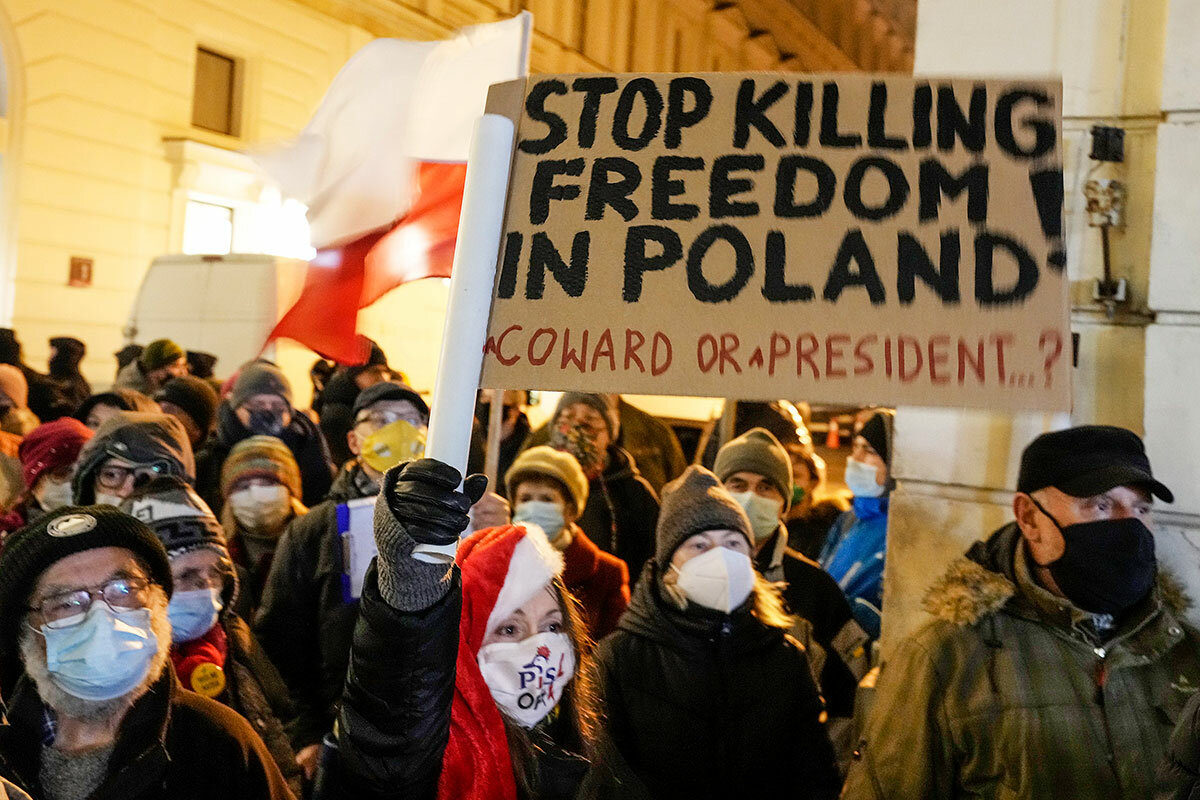Poland given pass on rights violations because of Ukraine war role
Loading...
| London
At first sight, the political map of Europe 10 weeks after Vladimir Putin launched his war on Ukraine would warm the cockles of any Western strategist’s heart. The view from 30,000 feet shows unprecedented levels of unity, both among European states and within the transatlantic NATO alliance.
Yet a closer look reveals another aspect of this newfound harmony, a kind of democratic paradox at the heart of the West’s response to the Russian invasion. It is most clearly evident in Poland, the NATO member on Ukraine’s border.
Three months ago, Poland was a political pariah in Washington and European capitals. Today, Warsaw is an increasingly pivotal ally.
Why We Wrote This
Sometimes values are relative. The U.S. is turning a blind eye to Poland’s violations of democratic rights in light of the government’s central role in the anti-Moscow coalition.
Not long ago, Poland’s government was coming in for sharp criticism – and even being punished – for its violations of European Union principles and rules regarding media freedom, the protection of minorities, and judicial independence.
But the Ukraine invasion has overshadowed such concerns. The security imperative has imposed itself.
The war has forced Washington and its European allies to downplay their traditional emphasis on democratic political values in the interests of forging a unified front against Moscow and deterring Mr. Putin from any such attacks in the future.
EU leaders, including France’s Emmanuel Macron, who now holds the union’s rotating six-month presidency, have muted their criticism of Poland and other self-professed “illiberal democracies” on their eastern flank.
Mr. Biden, for his part, chose Warsaw’s Royal Castle for the major address of his European visit one month after the invasion. He praised Poland’s role in NATO as well as its generous welcome for hundreds of thousands of refugees.
And in extolling the importance of democracy he avoided singling out President Andrzej Duda, a political soul mate of Donald Trump. “It is not enough to speak ... of freedom, equality, and liberty,” Mr. Biden said. “All of us, including here in Poland, must do the hard work of democracy each and every day. My country as well.”
Both he and European leaders have also been moving to reduce prewar tensions with two other NATO member states – Hungary and Turkey – that had faced criticism both for their human rights records and their warm relations with Mr. Putin.
There is undoubtedly frustration over Hungarian Prime Minister Viktor Orbán’s reluctance to back stronger energy sanctions against Russia. Lithuania’s foreign minister, though not mentioning Hungary by name, this week denounced “one member state” for holding the others “hostage” over the sanctions issue. But otherwise, EU leaders have avoided criticizing the recently reelected Mr. Orbán, preferring to emphasize his explicit condemnation of the Ukraine invasion and his acquiescence in earlier EU sanctions.
Turkey is a key member of NATO, but one that has followed its own path. President Recep Tayyip Erdoğan purchased a Russian anti-aircraft system in 2019, for example, prompting Washington to strike Turkey from the list of allies eligible to buy late-model F-35 fighter jets.
Mr. Erdoğan is threatening to block applications for NATO membership from Finland and Sweden because they’ve been hosting members of a Kurdish political party he regards as a “terrorist” organization. U.S. Secretary of State Antony Blinken is meeting his Turkish counterpart this week to try to smooth things over.
Washington is no neophyte when it comes to turning a diplomatic blind eye to the democratic failings of its allies in order to benefit from their security support. During the Cold War with the Soviet Union, successive U.S. administrations found themselves forging realpolitik partnerships with undemocratic leaders from Ferdinand Marcos in the Philippines to Nicaraguan dictator Anastasio Somoza.
But the latest trade-off comes on the heels of Mr. Biden’s insistence that the contest between democracy and autocracy is of central importance in today’s world.
And it carries even greater resonance because of Ukrainian President Volodymyr Zelenskyy’s forceful framing of the war as a litmus-test battle between the aggression of an autocrat and his country’s defense of its young democracy.
EU leaders do seem to sense the need to reassert their founding commitment to democratic values once the war in Ukraine is over.
Mr. Macon has long emphasized the importance of such principles. And in a speech last week to the European Parliament he proposed the creation of a “European political community” that would “enable democratic European nations who adhere to our values to find a new space for political cooperation” even before they qualify for European Union membership.
His deeper message seemed to be that although a unified front against the Ukraine invasion may be Europe’s top priority for now, the staying power of the Western alliance will ultimately rest on the kind of political foundations that only shared democratic values can provide.
To which President Zelenskyy would no doubt add: These are the values for which his countrymen and women have proved ready to fight and even die.







